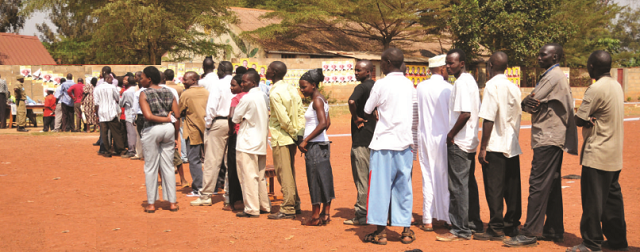
If held, Local Council One (LCI) elections would be the biggest political event in the country after the Presidential, Parliamentary, and district elections, but it now appears they will not be held any time soon. The question is why?
Part of the reason appears obvious. There was no Electoral Commission to conduct the elections. Although Museveni in November 2016 appointed a new Electoral Commission after the term of the old one expired, they only got sworn in on Jan. 17.
In the past, the official explanation from the government has also been that it does not have money to conduct the elections. But in December last year, the government changed tune and said instead that the Local Government Act under which the elections would be held needed to be amended.
Following the change of tune, Local Government Minister Tom Butime on Dec. 21, 2016 presented to parliament the Local Governments (Amendment) Bill 2016. Surprisingly, it raised very minor issues on areas such as duration of the campaign and display of voter registers that are almost irrelevant at local village election level.
Instead, its major recommendation was an endorsement in the Local Government (Amendment) Bill, 2014 that provides for lining up behind candidates during elections of chairpersons for village (LC1) and parish (LC2) levels that was passed by parliament on July 24, 2015.
The opposition Shadow Minister for Local Government, Mukono North Legislator Betty Nambooze, easily dismissed them.
“We are headed for a repeat of 2014,” she said in reference to controversy caused back then by an amendment that provided for voting by lining up behind candidates instead of using the secret ballot.
“It’s the third time in five years that parliament is amending this law,” Nambooze said.
Nambooze says the exercise has failed. She points at various `excuses’, that the village voter registers, which are supposed to be used in the exercise, have never been compiled, and that what she calls viable administrative units are lacking.
“It creates suspicion as to the motive of government on occasioning such delay if it is not deliberate lack of intent,” she said. She accuses the EC of lacking interest to organise the election.
In a Jan. 15 open letter to President Yoweri Museveni, the Citizens’ Coalition for Electoral Democracy (CCEDU), protested the government‘s proposal to have the vote by lining up behind their candidate instead of using the secret ballot.
The coalition of some 800 members across Uganda argued that voting by lining behind candidates fails to meet constitutional and international standards for public elections and could foment conflict and discord in communities.
Despite their protests, the amendments and recommendations were on Jan. 10 passed by parliament and voting in LC I will be by lining behind candidates.
Failure ahead?
Submitting a report on the elections to parliament on that day, Raphael Magyezi, the chairman of the Sectoral Committee on Public Service and Local Government said the government needed to give the EC Shs15.9 billion and conduct the elections by March 15.
But in an interview, the EC Spokesperson, Jotham Taremwa, sounded uncertain about when the elections would be held because until Jan.17 they were working without an Electoral Commission.
“There is even no guiding law in place,” he added, “The president has not yet assented to those amendments.”
This effectively means the LC I elections that had been scheduled for Jan, 17 are once again in limbo. The postponement has led many observers to say Museveni and his NRM party `fear’ the LC I elections because they offer an unpredictable test of grassroots popularity between the NRM government and the opposition.
The last LCI elections were held in 2001. Back then, the country was being governed under a de facto one party system called the “Movement System”. The country has since 2005 been under a multi-party system. In 2006 the LC I elections were frustrated by a Constitutional Court ruling on the petition by then opposition member of Forum for Democratic Change (FDC) Rtd Maj Rubaramira Ruranga, who challenged the legality of the incumbent Local Councils because they were set up under a different governance system. He argued that ushering in the multiparty system, required amending the law.
 The Independent Uganda: You get the Truth we Pay the Price
The Independent Uganda: You get the Truth we Pay the Price



